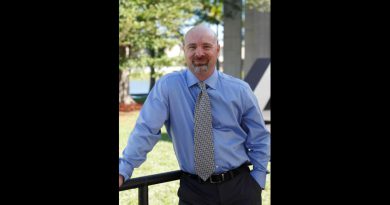Engineering Students Gain Experience While Supporting Local Agriculture
Arcel Diaz, the president of the Society For Hispanic Professional Engineers at North Campus, was on the hunt for hands-on projects for his organization to embark on last summer.
Then a sustainability-themed event hosted by the College’s Earth Ethics Institute shifted Diaz and his student organization’s plans for the remainder of the year. At the event, Diaz met local farmer Muriel Olivares. She gave Diaz and his group an opportunity to showcase their skills by building mobile cooling units from scratch that will serve to transport the farm’s produce.
On Nov. 5, after months of extensive research and planning, the club’s members began dismantling the walls of a pentagon-shaped trailer in the front yard of farmer Christopher French’s home in northeast Miami.
French, a 34-year-old self-proclaimed idealist, abandoned his desk-bound job three years ago to follow his dream of becoming a farmer. He then founded French Farms, a small harvesting company located in Homestead.
Olivares connected the engineers with Christopher French. She is one of the two partners in the Little River Cooperative, a small business that works to provide Miami with a number of gardening and vegetable services. With the help of French Farms, they offer locals a unique community supported agriculture. Apart from providing produce from small local farms, they also offer a nursery where one can buy all that is needed for starting an organic garden.
Both farms share tactics and equipment with one another—this is how the idea of a creating two refrigerator trailers came into mind. It’s not uncommon for college students to volunteer at Little River’s farms, but this is the first time a group of students participated in their joint effort.
Currently, they don’t have cold storage, so they have to pick the vegetables early in the morning or late at night, before the sun heats them up. Storing the produce in a mobile refrigerator would give them flexibility to harvest and sell on different days.
“A lot of our farms are kind of remote from where our market is,” French said. “I can’t really say enough about it. It’s a game changer for a small farm to have refrigeration.”
Since May, the engineers have been meeting with Olivares, her business partner Tiffany Noé, and French to plan out the project. They meticulously designed the unit virtually, with AutoCAD software.
Among the challenges they face is consolidating a functional vapor barrier that can stop humidity from forming and damaging vegetables stored in the trailers. They dissembled the thin wooden walls and flooring of the trailer in order to replace them with thicker ones and a layer of insulation.
Keeping the unit cool at all times is, of course, a priority.
To accomplish this, they are using a coolbot, a patented device that “tricks” the air conditioning system into thinking the temperature is higher to maintain it between 38 and 40 degrees. This small piece of hardware, conveniently adheres to the wall. According to French, they have saved thousands of dollars by choosing this gadget over a commercial cooling unit. Thanks to the coolbot, they only had to buy a typical window AC unit.
“It’s definitely exciting, to say the least. We planned more than we’ve worked on it, and now that we see how everything fits together and makes sense in some way,” Diaz said. “Once we do it in real life it’s like a scientific art type of thing.”
The team has held several meetings since May. Little River and French Farms invested approximately $8,000 in the trailers and other materials like wood panels, the AC units and the coolbots. The students do not own any copyright for this project. According to French, building makeshift mobile cooling unit is a very common practice among small farmers.
Two students of the 20-member club have been key to the project. Only the vice president Camilo Castillo, and the president Diaz, have juggled midterms and other responsibilities, finding time to work on the coolers during their free evenings.
During the pre-development stages of the project they all worked energetically to bring those plans to fruition. Every member of the club had a task assigned, whether it was to find feasible tutorials online or looking for adequate and affordable materials.
French strongly believes the students are taking a step further in their education.
“I graduated from the University of Florida as a mechanical engineer, and I think when people think of mechanical engineers they think of cars and little moving parts,” he said. “They don’t think that a big part of engineering is refrigeration, and the air conditioning, and energy conservation, and plumbing and basically, in general the movement of fluids. So for [the] engineering club to be doing refrigeration is right up their alley, even though they might not know it yet.”
Although Diaz is a full-time sophomore at North Campus and works 20 hours a week at Starbucks, he’s thrilled to be on board with Little River and French Farms.
“We’re totally excited too,” Diaz said. “We play music as we work so it’s not a project, it’s like a family activity kinda thing.”
Daniela Susana Molina contributed to this report.



